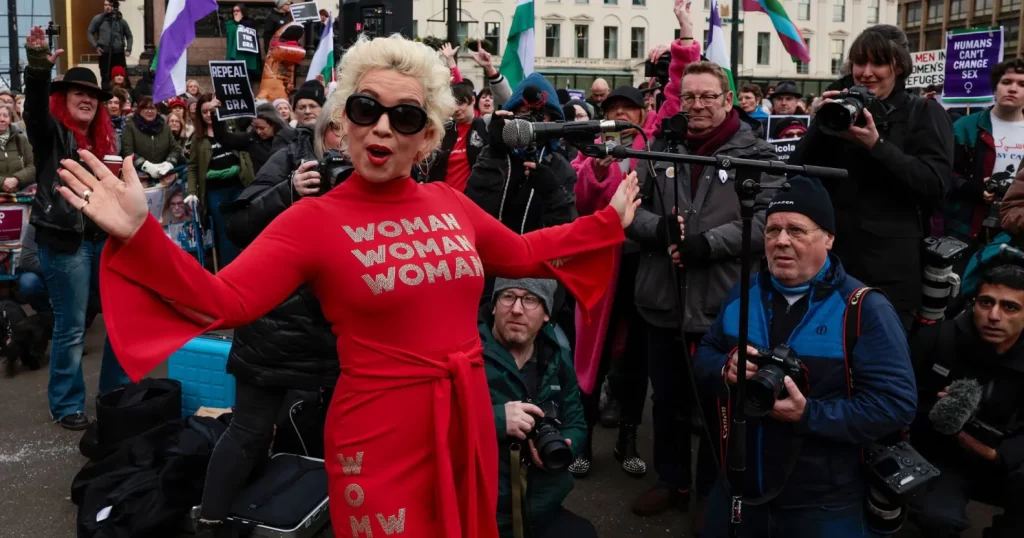Privilege and Ignorance: Posie Parker’s Misguided Comparison of Trans Protests to Women’s Rights in Iran
Despite calling herself a feminist, Keen-Minshull’s anti-trans, white supremacy-laced brand of feminism has victimized yet another minority group: Iranian women.

Image Credit: Getty Images
I was recently assigned the task of compiling a comprehensive report on Kellie-Jay Keen-Minshull, also known as Posie Parker, and her recent visit to New Zealand. Keen-Minshull is a British, self-described radical feminist who has quickly become one of Britain’s most notorious anti-trans rights activists. She is currently on her controversial “Let Women Speak” tour as part of her campaign Standing for Women, visiting various cities including New York, Los Angeles, London, and Melbourne. Despite calling herself a feminist, Keen-Minshull’s anti-trans, white supremacy-laced brand of feminism has victimized yet another minority group: Iranian women.
Keen-Minshull and her supporters have been known to promote legislation that discriminates against trans rights in both the UK and the US. She is generally unfazed by counter-protestors and has recently taken to Twitter to warn that any woman who stands in her way will be “annihilated.” In the same lengthy broadcast, Keen-Minshull went on to compare trans women to sexual predators and serial killers.
It is unsurprising that among Keen-Minshull’s supporters are far-right extremists and white supremacists, as evidenced by their attendance at her Melbourne event, where they made Nazi salutes and displayed signs that accused trans people of being child abusers. These actions caused significant alarm within the LGBTQ+ community, with groups and coalitions urging pro-trans activists to attend her following event in Auckland, New Zealand.
As a result, on Saturday, March 25, Keen-Minshull was met by more than 2000 counter-protesters, who substantially overshadowed her supporters. The Auckland protest grew chaotic, with Keen-Minshull claiming she was nearly crushed on her way to the podium and calling trans rights supporters “terrorists.” The counter-protesters continued their chants, allegedly throwing eggs at Keen-Minshull, ultimately forcing her to flee after being doused with tomato juice by an activist. As a result, Keen-Minshull canceled the rest of her events in New Zealand and went on a Twitter rant condemning the activists and calling the counter-protests and tomato juice incident “anti-women terrorism.”
I was dismayed to find that Keen-Minshull took to Twitter to draw a parallel between her treatment in New Zealand and the treatment of Iranian women by the Islamic Republic (IR). While I applaud Keen-Minshull’s awareness of women’s rights violations in Iran, as an Iranian woman myself, I feel compelled to express my concerns over this comparison, which is now echoing throughout Twitter.
Condemning supporters of transgender rights, Keen-Minshull wrote, “Glad you had a great time. I’ve heard some women in Iran love it when a woman is beaten in the street for removing her hijab. Go you.” I am appalled that an activist who sees herself as a women’s rights advocate and leader would equate eggs and tomato juice to bullets and whips. Keen-Minshull’s tweet not only indicates a level of ignorance and blind privilege but also suggests a deliberate disregard for history and the countless injustices and human rights violations Iranian women have endured for over four decades.
Likewise, Rukshan Fernando, an Australian political commentator, shared similar sentiments regarding Keen-Minshull’s treatment in Melbourne. Fernando made a jesting comparison between the Victorian parliament and the IR, following the decision to suspend a member of the Victorian Legislative Council for nine months for attending the Melbourne rally. Innocent gallows humor, surely, but it is important to consider how such casual comparisons invite less thoughtful observers – Keen-Minshull and some Twitter users – to downplay the severity of the IR’s actions and the thousands of Iranian men, women, and children who have faced brutal beatings, detainment, and/or execution for daring to assert their rights to basic human freedoms.
While Keen-Minshull may feel justifiably angry about her treatment by the counter-protestors and New Zealand authorities, there are vast disparities between her situation and that of women in Iran. Keen-Minshull is a free British woman who can travel the world and publicly voice her opinions about women’s rights. In contrast, under the IR’s oppressive interpretation and enforcement of Sharia law, Iranian women are not granted such liberties. They are not allowed to travel without the permission of their guardian or husband. They are not allowed to stand on a podium and speak out against the human rights violations they endure without being confronted with excessive force by the IR. Protesting Sharia laws and demanding basic human rights, such as unveiling one’s hair, can result in 10+ years of imprisonment and even execution. As sociology professor Michael Kimmel elegantly put it, “Privilege is invisible to those who have it.”
The Iranian people are exhausted by the downplaying of the injustices they have lived through. Women are not just being “beaten in the streets for removing her hijab.” Iranian women and children as young as 13 and 14 years old are subjected to stalking, detention, rape, and torture at the hands of the IR’s security forces. Careless throwaway remarks like Keen-Minshull’s serve to assist the IR’s efforts to minimize their crimes against humanity, prolonging their detention and execution sprees. As Baroness Eaton has argued, we lose credibility on women’s rights when we overlook the violations in Iran.
Sadly, the world seems to have already moved on from the social and political unrest in Iran. However, as activists and individuals with the freedom to share opinions and discuss women’s rights, it is incumbent upon us to ensure that the atrocities inflicted upon the voiceless victims of Iran’s oppressive regime are neither misrepresented nor trivialized by those who enjoy the luxury of speaking from safer platforms.
Nicky Kashani is a criminology and psychology graduate, and current masters student at NYU. Her research interests are drug policies, stigmatization, and labeling. For her undergraduate dissertation, she conducted a preliminary investigation of Oregon’s drug policy reform, and assessed the processes, benefits, and adverse effects of the decriminalization of illicit drugs. More recently, she has discovered a passion for journalism and has begun writing about current events in Iran. She is also an assistant editor at Caustic Frolic, an interdisciplinary journal that publishes fiction, nonfiction, poetry, art, and digital and mixed media. She looks forward to further pursuing journalism in the near future.






“… ultimately forcing her to flee after being doused with tomato juice by an activist.”
The above is false. The security was already escorting Kellie-Jay from the podium because of the immediate danger of violence, and the yob threw the soup over her while she was being helped to safety.